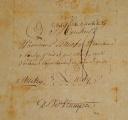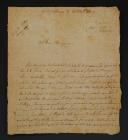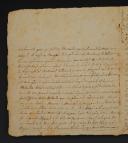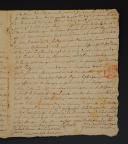
Great Army. AUTOGRAPH LETTER FROM SOLDIER BAUCHE, horse chasseur of the 7th Company of the Imperial Guard, TO HIS FATHER (living in Lardy), Gros Falkenau, April 20th, 1807. 18855-21.
Sold out
Grande Armée. AUTOGRAPH LETTER FROM SOLDIER BAUCHE, cavalry hunter of the 7th Company of the Imperial Guard, TO HIS FATHER (residing in Lardy), Gros Falkenau on April 20, 1807. 18855-21
With address "To Sir / Mr. Bauche, Merchant in Lardy / near and via Étréchy on the road to Orléans in the Seine-et-Oise department / In Lardy / In Étréchy."
Postal stamp "No. 6 GRANDE ARMÉE."
Detailed description of the battle of February 8, 1807.
"Gros Falkenau on April 20, 1807".
"My dear father,
You asked me for the outcome of the battle of Preussisch Eylau which took place on February 8. Few battles have been as bloody, Marengo, Ulm, Austerlitz, Jena are nothing. I can only speak of it by hearsay, as I did not have the honor to be present as I had already been wounded. This fall has greatly harmed me, depriving me of the rank of quartermaster and a powerful support. My colonel, who had just been appointed general and was my protector, was killed there. The attack began at dawn with a discharge from their artillery aimed at the Emperor's quarters, several cannonballs fell in the courtyard, but His Majesty was already on horseback. The enemy, with 90,000 men, attacked the French who had only 35,000 fighters to oppose them. They fought all day and the cavalry of the Guard performed wonders, especially the cavalry hunters. The regiment charged three times against the numerous enemy battalions [...] Our artillery, that is the Guard's artillery, performed marvelously [...].
We saw Prince Murat at the head of the Guard's cavalry hunters leading them with his voice and gestures, saying to us, "Come on, my friends, His Majesty sees us, Long live the Emperor. Here are those we must crush!" [...]
The Emperor himself faced the greatest dangers. General Corbineau, his aide-de-camp, was killed by his side and it was only at the end and with urgent prayers that he moved away a bit from the effects of the fire. The result was the battlefield which we won. In the evening, Marshal Ney arrived with his corps and fell upon the enemy with the bayonet, leaving the ground covered with dead bodies. After this terrible day, His Majesty redeployed the army into quarters where it remains. After the affair, Marshal Bessière came to compliment the regiment on its good conduct [...].
As for the future, everyone is ignorant, the greatest secrecy prevails in matters. Nothing leaks out. Talks of returning to campaigns are heard, as for me, I have developed a kind of philosophy, nothing frightens me [...].
Signed BAUCHE Cavalry Hunter 7th Company Imperial Guard of the Grand Army."
Double sheet. H 20 cm x 17.5 cm. 3 pages of closely written text.
Good condition, foxing, traces of folds, tear at the central fold.
HISTORICAL CONTEXT:
The Battle of Eylau took place on February 7 and 8, 1807, at Preußisch Eylau (modern-day Bagrationovsk) in northern East Prussia (current Kaliningrad Oblast), between the forces of the Russian Empire, supported by those of the Kingdom of Prussia, and the French Empire. The latter, after the battle, achieved what turned out to be a hard-won victory at a heavy cost.
Napoleon I remained master of the field but did not achieve the decisive victory he expected.
With address "To Sir / Mr. Bauche, Merchant in Lardy / near and via Étréchy on the road to Orléans in the Seine-et-Oise department / In Lardy / In Étréchy."
Postal stamp "No. 6 GRANDE ARMÉE."
Detailed description of the battle of February 8, 1807.
"Gros Falkenau on April 20, 1807".
"My dear father,
You asked me for the outcome of the battle of Preussisch Eylau which took place on February 8. Few battles have been as bloody, Marengo, Ulm, Austerlitz, Jena are nothing. I can only speak of it by hearsay, as I did not have the honor to be present as I had already been wounded. This fall has greatly harmed me, depriving me of the rank of quartermaster and a powerful support. My colonel, who had just been appointed general and was my protector, was killed there. The attack began at dawn with a discharge from their artillery aimed at the Emperor's quarters, several cannonballs fell in the courtyard, but His Majesty was already on horseback. The enemy, with 90,000 men, attacked the French who had only 35,000 fighters to oppose them. They fought all day and the cavalry of the Guard performed wonders, especially the cavalry hunters. The regiment charged three times against the numerous enemy battalions [...] Our artillery, that is the Guard's artillery, performed marvelously [...].
We saw Prince Murat at the head of the Guard's cavalry hunters leading them with his voice and gestures, saying to us, "Come on, my friends, His Majesty sees us, Long live the Emperor. Here are those we must crush!" [...]
The Emperor himself faced the greatest dangers. General Corbineau, his aide-de-camp, was killed by his side and it was only at the end and with urgent prayers that he moved away a bit from the effects of the fire. The result was the battlefield which we won. In the evening, Marshal Ney arrived with his corps and fell upon the enemy with the bayonet, leaving the ground covered with dead bodies. After this terrible day, His Majesty redeployed the army into quarters where it remains. After the affair, Marshal Bessière came to compliment the regiment on its good conduct [...].
As for the future, everyone is ignorant, the greatest secrecy prevails in matters. Nothing leaks out. Talks of returning to campaigns are heard, as for me, I have developed a kind of philosophy, nothing frightens me [...].
Signed BAUCHE Cavalry Hunter 7th Company Imperial Guard of the Grand Army."
Double sheet. H 20 cm x 17.5 cm. 3 pages of closely written text.
Good condition, foxing, traces of folds, tear at the central fold.
HISTORICAL CONTEXT:
The Battle of Eylau took place on February 7 and 8, 1807, at Preußisch Eylau (modern-day Bagrationovsk) in northern East Prussia (current Kaliningrad Oblast), between the forces of the Russian Empire, supported by those of the Kingdom of Prussia, and the French Empire. The latter, after the battle, achieved what turned out to be a hard-won victory at a heavy cost.
Napoleon I remained master of the field but did not achieve the decisive victory he expected.
Reference :
18855-21
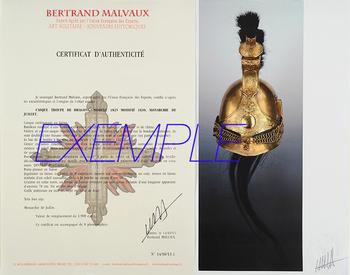
Next update Friday, January 30 at 13:30 PM
FOR ALL PURCHASES, PAYMENT IN MULTIPLE CHECKS POSSIBLE
bertrand.malvaux@wanadoo.fr 06 07 75 74 63
SHIPPING COSTS
Shipping costs are calculated only once per order for one or more items, all shipments are sent via registered mail, as this is the only way to have proof of dispatch and receipt.
For parcels whose value cannot be insured by the Post, shipments are entrusted to DHL or Fedex with real value insured, the service is of high quality but the cost is higher.
RETURN POLICY
Items can be returned within 8 days of receipt. They must be returned by registered mail at the sender's expense, in their original packaging, and in their original condition.
AUTHENTICITY
The selection of items offered on this site allows me to guarantee the authenticity of each piece described here, all items offered are guaranteed to be period and authentic, unless otherwise noted or restricted in the description.
An authenticity certificate of the item including the description published on the site, the period, the sale price, accompanied by one or more color photographs is automatically provided for any item priced over 130 euros. Below this price, each certificate is charged 5 euros.
Only items sold by me are subject to an authenticity certificate, I do not provide any expert reports for items sold by third parties (colleagues or collectors).
FOR ALL PURCHASES, PAYMENT IN MULTIPLE CHECKS POSSIBLE
bertrand.malvaux@wanadoo.fr 06 07 75 74 63
An authenticity certificate of the item including the description published on the site, the period, the sale price, accompanied by one or more color photographs is automatically provided for any item priced over 130 euros. Below this price, each certificate is charged 5 euros.
Only items sold by me are subject to an authenticity certificate, I do not provide any expert reports for items sold by third parties (colleagues or collectors).
